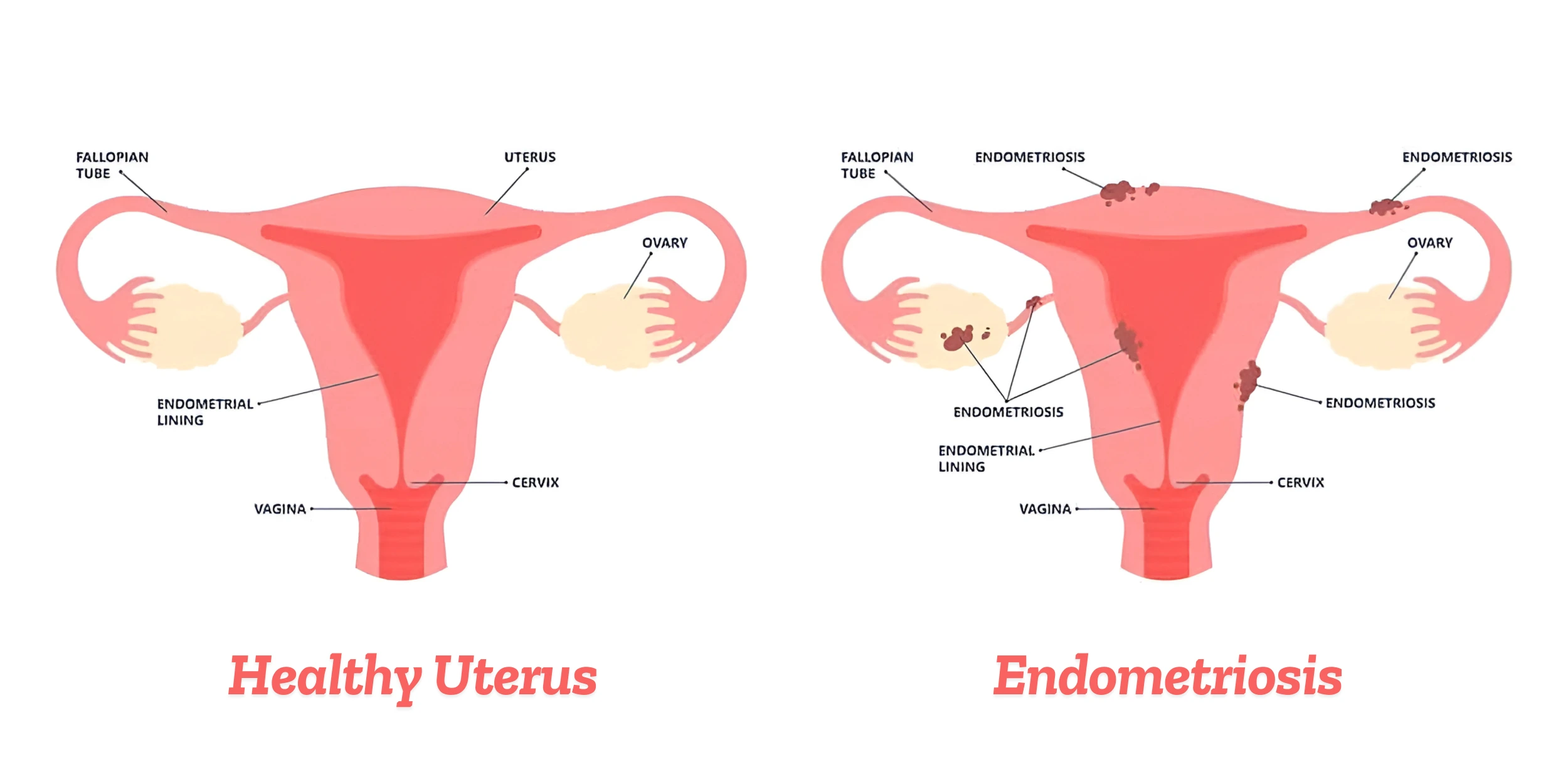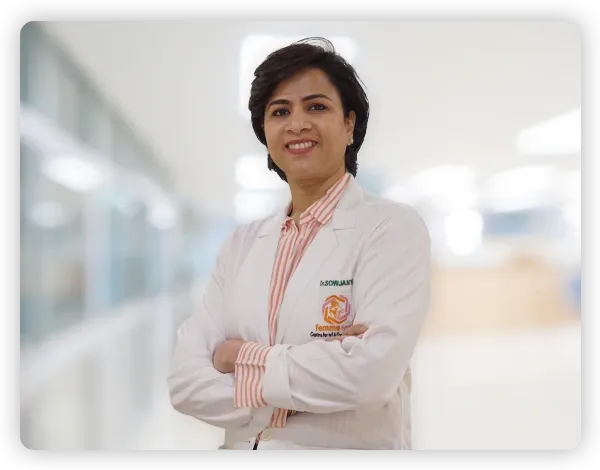Millions of women worldwide suffer from endometriosis, and treatment is imperative to improving their quality of life and fertility. Femmenest IVF Centre specializes in managing women suffering from endometriosis. The expert team ensures patients receive a most fitting, effective, individualized treatment.
What is Endometriosis?
Endometriosis is a condition where tissue similar to the lining inside the uterus starts to grow outside the uterus, typically on the ovaries, fallopian tubes, or other organs in the pelvic cavity. That tissue acts under hormonal changes like the endometrial lining, resulting in inflammation, pain, and sometimes infertility.
Understanding the Condition and Its Symptoms
The symptoms of endometriosis differ widely from one woman to another, varying from very mild to very severe. The most common symptoms are chronic pelvic pain, heavy bleeding during menses, or pain during sexual intercourse. It may sometimes hinder the chances of conception.
Early Signs and Symptoms of Endometriosis
Finding early symptoms allows for faster diagnosis and a proportionately better treatment plan. Some of the important symptoms include:
- Chronic pelvic or lower back pain
- Painful periods (dysmenorrhea)
- Heavy menstrual bleeding or spotting between periods
- Pain during or after sex
- Fatigue, bloating, or nausea
If you experience any of them, seeking medical counsel from an endometriosis treatment specialist in Delhi is always advisable.
Causes and Risk Factors for Endometriosis
Although the precise reason behind endometriosis continues to remain unclear, several risk factors are known to increase the risk of this disease.
- Familial occurrence of endometriosis
- The beginning of menstruation at an early age
- Shortness of menstrual cycles
- An increase in estrogen levels
- Disorders of the immune system
At Femmenest IVF Centre, our doctors will identify those specific risk factors related to your condition and then provide suitable treatment solutions.
Comprehensive Endometriosis Treatment Delhi
Endometriosis treatments focus on symptom suppression, improving the quality of life, and solving fertility problems with a medication plan, surgery, and assisted reproductive technologies. Femmenest IVF Centre has treatments for endometriosis patients.
Medical Treatment for Endometriosis
The hormonal therapy included in the first treatment line is aimed at estrogens' depletive effects, contributing to a significant reduction of ectopic endometrial tissue growth. Treatment options thus include:
- Antiproliferative oral contraceptives regulate cycles and decrease blood loss.
- GnRH agonists disable ovarian function and induce a temporary menopause-like state.
- Progestin therapy to thin and atrophy the endometrial lining.
- These and other pain-management medications, such as NSAIDs, help control discomfort associated with endometriosis.
Surgical Treatments for Endometriosis
If present, debilitating symptoms warrant such intervention; otherwise, medical treatment usually suffices for the initial management of the condition. Furthermore, the laparoscopic surgical technique performed by our experts at Femmenest IVF Centre is minimally invasive. If any endometrial tissue is found postoperatively, it can be removed to relieve pain and improve fertility.
Why Select Femmenest IVF Center for Endometriosis Treatments?
At Femmenest IVF Centre, we excel in some of the most complex gynaecological conditions, and endometriosis is one of these. The highly trained doctors and supporting staff offer the following:
- Tailor-made personal treatment plans
- Advanced diagnostics
- Specialists in medical and surgical management
Best Endometriosis Specialists in Delhi
Our centre is home to some of the best endometriosis specialist in Delhi who are trained in the latest treatment techniques. Whether medical or surgical, whichever will be the best approach for you, our doctors will deliver that, keeping your needs in mind.
Advanced Techniques and Modern Technology
To execute minimally invasive procedures with short recovery time and minimal pain suffered by patients, Femmenest Private Hospital applies advanced technology and laparoscopic surgery. Our commitment is to set the highest standards in care at Femmenest IVF Centre.
Finding the Best Doctor for Endometriosis in Delhi
Choosing the right doctor becomes essential for effective treatment, as the best doctor for endometriosis should possess a great deal of knowledge on the ailment, be patient, and have a patient-centred strategy. Such qualities can be found in the doctors at Femmenest IVF Centre; they are all about educating patients regarding their ailments and closely working with them to develop treatment plans aligning with their requirements.
Traits of the Best Endometriosis Specialists
When searching for an endometriosis specialist, keep in mind these things listed as traits:
- Experience and expertise in diagnosing and treating endometriosis
- Compassion and empathy in relating to the patient
- Ability to provide both medical and surgical treatment options
- Strong communication with a clear explanation of treatment plans
Femmenest IVF Centre confirms having all these to ensure the highest possible standard of care.
Endometriosis Treatment Cost in Delhi
Endometriosis surgery involves multiple components, each contributing to the overall cost. These expenses can vary significantly depending on the hospital, surgical method, and post-operative care. Below is a detailed breakdown of the costs:
| Component |
Estimated Cost (₹) |
| Diagnostic Tests |
100 - 8,000 |
| Surgical Treatment |
60,000 - 1,00,000 (Laparoscopy)
70,000 - 1,20,000 (Open Surgery)
|
| Hospital Charges |
10,000 - 30,000 |
| Medications |
2,000 - 5,000 (Medications) |
| Follow-Up Visits |
500 - 1,000 (Follow-Up per visit) |
What is the duration of the treatment period for endometriosis?
Some periods might demand for treatment to take effect. It would essentially be effective through medications; surgery brings immediate but takes a toll on the recovery period. The procedure must be thoroughly explained to your doctor with realistic timelines suitable to your condition.
How to Take Care of Post-treatment in an Endometriosis Patient
Follow-up Care Further, recovery must be given post-treatment along with symptom management, which would be lifestyle advice, dietary changes, and other therapies for overall fitness from your doctor.
What is the Experience of Femmenest IVF Centre Patients During Endometriosis Treatment?
Born out of an understanding of what will be the most comfortable and supportive for you, Femmenest IVF Centre will not compromise when it comes to your comfort. The first time you come in, it teams up with you to create an individualised treatment process that addresses your specific needs. You will receive compassionate care, cutting-edge procedures, and regular follow-ups to track your faring.
Patient Testimonials and Success Stories
A more significant proportion of our patients can get through the hurdles that come with endometriosis and now have much higher fertility levels because of the treatment we've been giving them. We're pretty damn proud of the good things that have been achieved in bringing changes into their lives.
Conclusion
At Femmenest IVF Centre, we integrate state-of-the-art technology and a deep understanding of compassionate care with expertise concerning the disease to effectively treat endometriosis. Whether patients are in search of alleviation from pain or conniving on improving their fertility, we provide comprehensive treatment options suited to personal needs.























